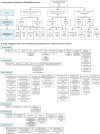The administrative burden of medication affordability resources: an environmental scan with implications for health informatics to advance health equity
- PMID: 40538336
- PMCID: PMC12204073
- DOI: 10.1093/jamia/ocaf087
The administrative burden of medication affordability resources: an environmental scan with implications for health informatics to advance health equity
Abstract
Objective: To characterize and demonstrate how to reduce the administrative burden experienced by patients when navigating medication affordability resources in the United States.
Materials and methods: Informed by administrative burden theory, we conducted an environmental scan of medication affordability resources for atrial fibrillation, and four common comorbidities (diabetes, heart failure, hypertension, and lipid disorder). We systematically searched for resources (eg, patient assistance programs, savings cards and nonprofit support) and extracted information about types, eligibility criteria, needed documentation, and application processes.
Results: We identified 66 resources across 12 categories across the five conditions. The resources' varied eligibility criteria, application processes, and requirements for providing sensitive financial documents could introduce multiple administrative costs for patients.
Discussion: The volume and complexity of medication affordability resources and related application processes may create substantial administrative burden for patients that could prevent their use-especially when prescribed multiple medications.
Conclusion: Medication affordability resource informatics tools that reduce administrative burden could advance equitable medication access.
Keywords: consumer health informatics; cost of illness; healthcare disparities; medication adherence; social determinants of health.
© The Author(s) 2025. Published by Oxford University Press on behalf of the American Medical Informatics Association.
Conflict of interest statement
None declared.
Figures



Similar articles
-
How lived experiences of illness trajectories, burdens of treatment, and social inequalities shape service user and caregiver participation in health and social care: a theory-informed qualitative evidence synthesis.Health Soc Care Deliv Res. 2025 Jun;13(24):1-120. doi: 10.3310/HGTQ8159. Health Soc Care Deliv Res. 2025. PMID: 40548558
-
Providing physicians with feedback on medication adherence for people with chronic diseases taking long-term medication.Cochrane Database Syst Rev. 2018 Jan 10;1(1):CD012042. doi: 10.1002/14651858.CD012042.pub2. Cochrane Database Syst Rev. 2018. PMID: 29320600 Free PMC article.
-
Shared decision-making for people with asthma.Cochrane Database Syst Rev. 2017 Oct 3;10(10):CD012330. doi: 10.1002/14651858.CD012330.pub2. Cochrane Database Syst Rev. 2017. PMID: 28972652 Free PMC article.
-
Rapid molecular tests for tuberculosis and tuberculosis drug resistance: a qualitative evidence synthesis of recipient and provider views.Cochrane Database Syst Rev. 2022 Apr 26;4(4):CD014877. doi: 10.1002/14651858.CD014877.pub2. Cochrane Database Syst Rev. 2022. PMID: 35470432 Free PMC article.
-
Professional, structural and organisational interventions in primary care for reducing medication errors.Cochrane Database Syst Rev. 2017 Oct 4;10(10):CD003942. doi: 10.1002/14651858.CD003942.pub3. Cochrane Database Syst Rev. 2017. PMID: 28977687 Free PMC article.
References
-
- Lopes L, Montero A, Presiado M, et al. Americans’ challenges with health care costs, 2024. Accessed December 23, 2024. https://www.kff.org/health-costs/issue-brief/americans-challenges-with-h...
-
- Mykyta L, Cohen RA. Characteristics of adults aged 18-64 who did not take medication as prescribed to reduce costs: United States, 2021. National Center for Health Statistics. 2023:1–8. - PubMed
-
- Senteio C, Veinot T. Trying to make things right: adherence work in high-poverty, African American neighborhoods. Qual Health Res. 2014;24:1745–1756. - PubMed
-
- Califf RM, Slavitt A. Lowering cost and increasing access to drugs without jeopardizing innovation. JAMA. 2019;321:1571–1573. - PubMed
MeSH terms
LinkOut - more resources
Full Text Sources

